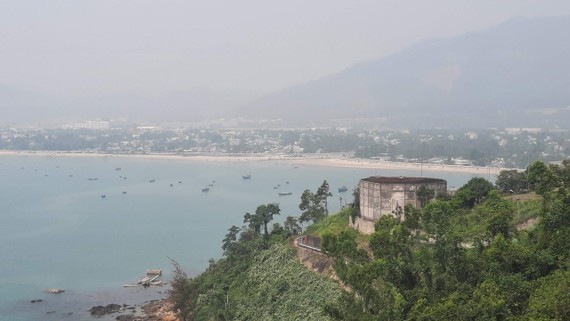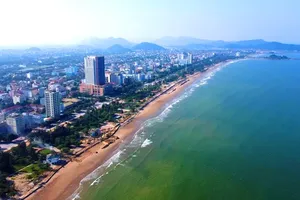 The location of Lien Chieu Port which will be one of the key international gateways of Vietnam. (Photo: SGGP)
The location of Lien Chieu Port which will be one of the key international gateways of Vietnam. (Photo: SGGP)
The port will allow access to 200,000 deadweight tonnage (DWT) cargo ships and container ships with loading capacities from 8,000 to 18,000 twenty-foot equivalent unit (TEUs) as well as 30,000DTW liquid cargo vessels in 2050.
The city’s management unit of priority infrastructure projects said the port construction plan will be following the country’s master plan on the seaport system until 2030, making it a key port in the central region and the third largest port system in Vietnam.
The 20-berth port, which was designed to handle from 40 million to 50 million tons of cargo in 2050, will be used as the main logistics center for the north-south railway and road systems and the East-West Economic Corridor No 2 (EWEC2) connecting Thailand, Myanmar, Laos and Vietnam via Da Nang port system, the unit managing board said.
It said the first phase of the construction in 2021-25 will include two 750m berths for container ships with a loading capacity of 8,000TEUs (100,000DWT), a 7.3km shipping lane and a 1.17km water breaker dyke system.
A 6-lane 2.95km coastal road connecting the national road system and the port and a 1.2km inner port road will be built in 2022-25.
It’s expected that 12 more berths for container ships and liquid cargo vessels will be added to help the port increase its capacity to 25 million tons in 2030.
A six-berth integrated port and an inner port along with a 90ha logistic center will be invested in 2050, making the Lien Chieu Port an international entrance port – the third in Vietnam after Lach Huyen Port in Hai Phong city and Cai Mep-Thi Vai in Ba Ria-Vung Tau province.
The construction of the Lien Chieu Port will help ease the overloaded Tien Sa Port – which currently hosts both cruise and cargo ships.
According to the transport ministry, the development of Lien Chieu Port would turn the central city into a main international-standard logistics center for Vietnam, ASEAN and the Asia Pacific region as the city is one of the key gateways to the East Sea from the sub-Mekong region.
The city’s management unit of priority infrastructure projects said the port construction plan will be following the country’s master plan on the seaport system until 2030, making it a key port in the central region and the third largest port system in Vietnam.
The 20-berth port, which was designed to handle from 40 million to 50 million tons of cargo in 2050, will be used as the main logistics center for the north-south railway and road systems and the East-West Economic Corridor No 2 (EWEC2) connecting Thailand, Myanmar, Laos and Vietnam via Da Nang port system, the unit managing board said.
It said the first phase of the construction in 2021-25 will include two 750m berths for container ships with a loading capacity of 8,000TEUs (100,000DWT), a 7.3km shipping lane and a 1.17km water breaker dyke system.
A 6-lane 2.95km coastal road connecting the national road system and the port and a 1.2km inner port road will be built in 2022-25.
It’s expected that 12 more berths for container ships and liquid cargo vessels will be added to help the port increase its capacity to 25 million tons in 2030.
A six-berth integrated port and an inner port along with a 90ha logistic center will be invested in 2050, making the Lien Chieu Port an international entrance port – the third in Vietnam after Lach Huyen Port in Hai Phong city and Cai Mep-Thi Vai in Ba Ria-Vung Tau province.
The construction of the Lien Chieu Port will help ease the overloaded Tien Sa Port – which currently hosts both cruise and cargo ships.
According to the transport ministry, the development of Lien Chieu Port would turn the central city into a main international-standard logistics center for Vietnam, ASEAN and the Asia Pacific region as the city is one of the key gateways to the East Sea from the sub-Mekong region.
























